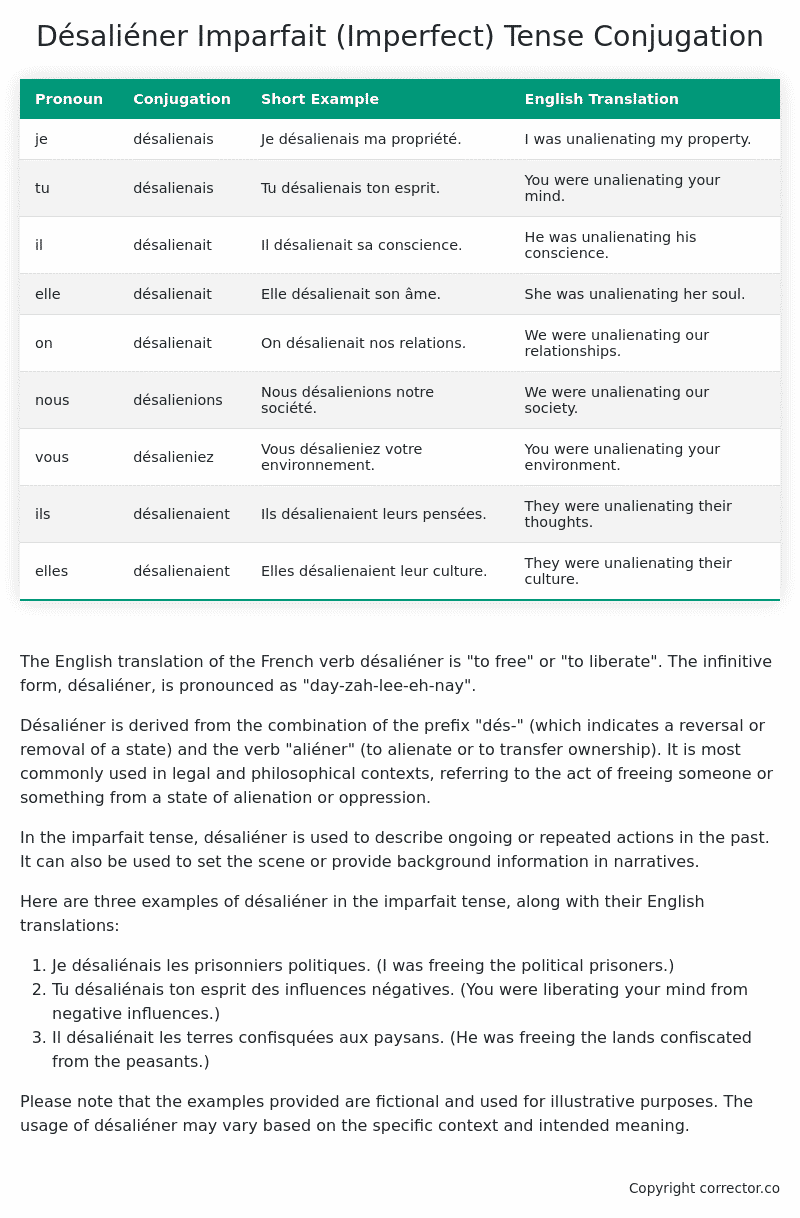Imparfait (Imperfect) Tense Conjugation of the French Verb désaliéner
Introduction to the verb désaliéner
The English translation of the French verb désaliéner is “to free” or “to liberate”. The infinitive form, désaliéner, is pronounced as “day-zah-lee-eh-nay”.
Désaliéner is derived from the combination of the prefix “dés-” (which indicates a reversal or removal of a state) and the verb “aliéner” (to alienate or to transfer ownership). It is most commonly used in legal and philosophical contexts, referring to the act of freeing someone or something from a state of alienation or oppression.
In the imparfait tense, désaliéner is used to describe ongoing or repeated actions in the past. It can also be used to set the scene or provide background information in narratives.
Here are three examples of désaliéner in the imparfait tense, along with their English translations:
- Je désaliénais les prisonniers politiques. (I was freeing the political prisoners.)
- Tu désaliénais ton esprit des influences négatives. (You were liberating your mind from negative influences.)
- Il désaliénait les terres confisquées aux paysans. (He was freeing the lands confiscated from the peasants.)
Please note that the examples provided are fictional and used for illustrative purposes. The usage of désaliéner may vary based on the specific context and intended meaning.
Table of the Imparfait (Imperfect) Tense Conjugation of désaliéner
| Pronoun | Conjugation | Short Example | English Translation |
|---|---|---|---|
| je | désalienais | Je désalienais ma propriété. | I was unalienating my property. |
| tu | désalienais | Tu désalienais ton esprit. | You were unalienating your mind. |
| il | désalienait | Il désalienait sa conscience. | He was unalienating his conscience. |
| elle | désalienait | Elle désalienait son âme. | She was unalienating her soul. |
| on | désalienait | On désalienait nos relations. | We were unalienating our relationships. |
| nous | désalienions | Nous désalienions notre société. | We were unalienating our society. |
| vous | désalieniez | Vous désalieniez votre environnement. | You were unalienating your environment. |
| ils | désalienaient | Ils désalienaient leurs pensées. | They were unalienating their thoughts. |
| elles | désalienaient | Elles désalienaient leur culture. | They were unalienating their culture. |
Other Conjugations for Désaliéner.
Le Present (Present Tense) Conjugation of the French Verb désaliéner
Imparfait (Imperfect) Tense Conjugation of the French Verb désaliéner (You’re reading it right now!)
Passé Simple (Simple Past) Tense Conjugation of the French Verb désaliéner
Passé Composé (Present Perfect) Tense Conjugation of the French Verb désaliéner
Futur Simple (Simple Future) Tense Conjugation of the French Verb désaliéner
Futur Proche (Near Future) Tense Conjugation of the French Verb désaliéner
Plus-que-parfait (Pluperfect) Tense Conjugation of the French Verb désaliéner
Passé Antérieur (Past Anterior) Tense Conjugation of the French Verb désaliéner
Futur Antérieur (Future Anterior) Tense Conjugation of the French Verb désaliéner
Subjonctif Présent (Subjunctive Present) Tense Conjugation of the French Verb désaliéner
Subjonctif Passé (Subjunctive Past) Tense Conjugation of the French Verb désaliéner
Subjonctif Imparfait (Subjunctive Imperfect) Tense Conjugation of the French Verb désaliéner
Subjonctif Plus-que-parfait (Subjunctive Pluperfect) Tense Conjugation of the French Verb désaliéner
Conditionnel Présent (Conditional Present) Tense Conjugation of the French Verb désaliéner
Conditionnel Passé (Conditional Past) Tense Conjugation of the French Verb désaliéner
Conditionnel Passé II (Conditional Past II) Tense Conjugation of the French Verb désaliéner
L’impératif Présent (Imperative Present) Tense Conjugation of the French Verb désaliéner
L’impératif Passé (Imperative Past) Tense Conjugation of the French Verb désaliéner
L’infinitif Présent (Infinitive Present) Tense Conjugation of the French Verb désaliéner
L’infinitif Passé (Infinitive Past) Tense Conjugation of the French Verb désaliéner
Le Participe Présent (Present Participle) Tense Conjugation of the French Verb désaliéner
Le Participe Passé (Past Participle) Tense Conjugation of the French Verb désaliéner
Struggling with French verbs or the language in general? Why not use our free French Grammar Checker – no registration required!
Get a FREE Download Study Sheet of this Conjugation 🔥
Simply right click the image below, click “save image” and get your free reference for the désaliéner imparfait tense conjugation!

Désaliéner – About the French Imparfait Tense
NOTE: To take a deep dive into all the French tenses then see our article on Mastering French Tense Conjugation.
Formation of the Imparfait Tense
For regular -er verbs:
For regular -ir verbs
For regular -re verbs
Common Everyday Usage Patterns
Description of Past Habits
Background Information
Mental and Emotional States
It’s employed to express emotions, thoughts, or physical sensations in the past. For example: “J’étais content quand il est arrivé.” (I was happy when he arrived.)
Ongoing Actions
Points to Note About the Imparfait Tense
Passé Composé vs. Imparfait
Conditional
Si Clauses
Narration
I hope you enjoyed this article on the verb désaliéner. Still in a learning mood? Check out another TOTALLY random French verb imparfait conjugation!


